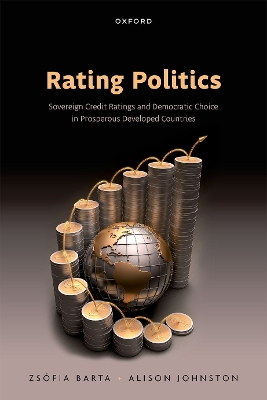How do countries' political and policy choices affect the credit ratings they receive? Sovereign ratings influence countries' cost of funding, and observers have long worried that rating agencies - these unelected, unappointed, unaccountable, for-profit organizations - can interfere with democratic sovereignty if they assign lower ratings to certain political and policy choices. The questions of whether, how, and why ratings react to policy and politics, however,
remain unexplored. Rating Politics opens the black box of sovereign ratings to uncover the logic that drives rating responses to political and policy factors. Relying on statistical analysis of rating scores, interviews with sovereign rating analysts, and a close reading of the official communications
of rating agencies about their decisions, Zsófia Barta and Alison Johnston show that ratings penalize center-left governments and many (though not all) policies associated with the center-left agenda. The motivation for such penalties is not rooted in assumptions about how those political and policy features affect growth and debt servicing capacity. Instead, ratings are lower in the presence of those features because they are expected to make a country more vulnerable to market panics
whenever the economy is hit by unforeseen shocks, as they signal insufficient willingness and/or ability to engage in determined austerity for the sake of reassuring markets. Since market panics and the resulting "sudden stops" of funding lead to humiliating collapses of ratings, rating agencies attempt to
insure themselves against "rating failures" by pre-emptively assigning lower ratings to countries with the "wrong" political and policy mix.
- ISBN10 0198878176
- ISBN13 9780198878179
- Publish Date 27 April 2023
- Publish Status Forthcoming
- Publish Country GB
- Imprint Oxford University Press
- Format Hardcover
- Pages 224
- Language English
